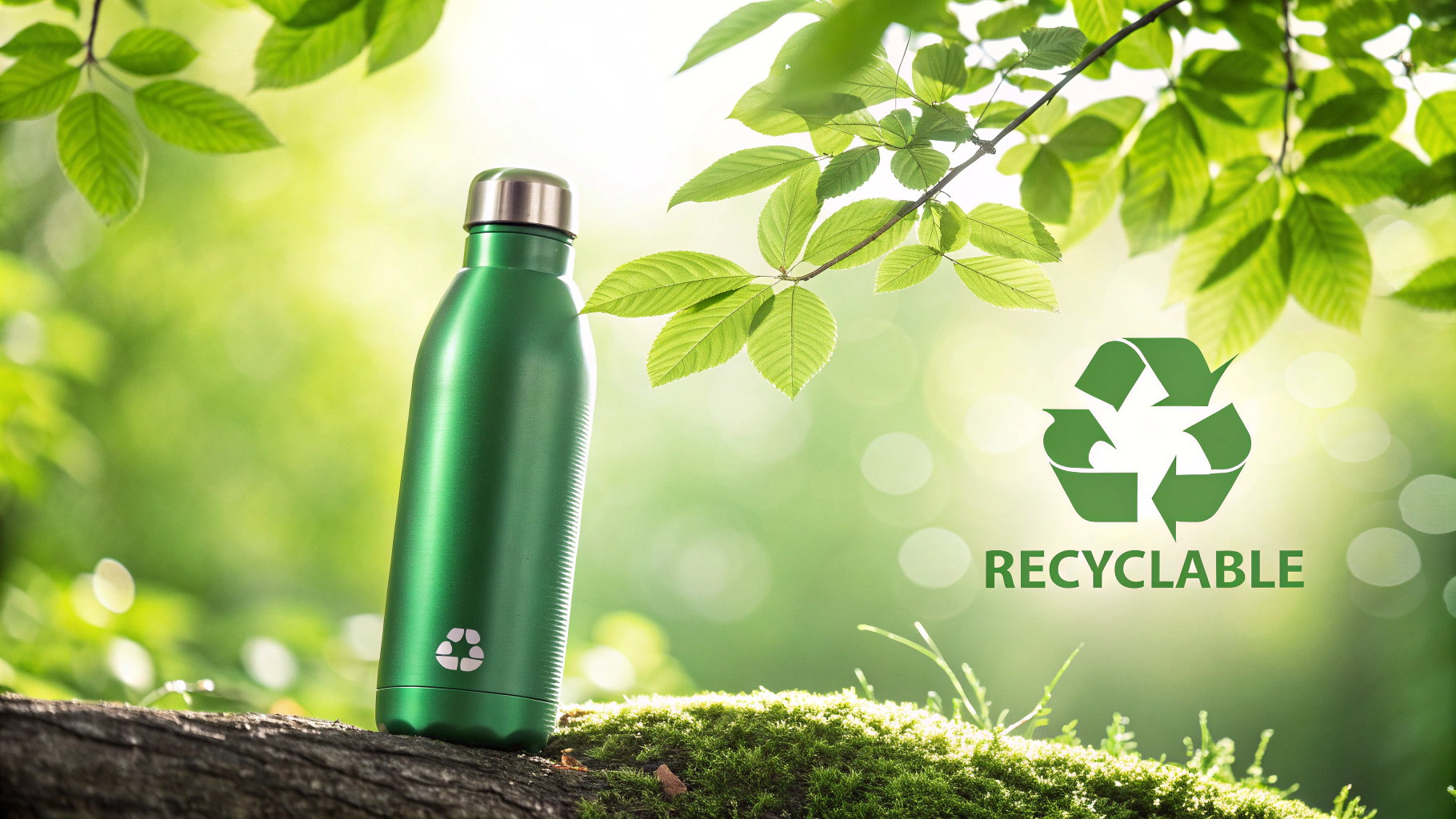
To source stainless steel drinkware efficiently, focus on supplier evaluation, customization options, and eco-friendly trends. This approach positions you to meet modern consumer demands while maintaining product quality.
Understanding that the modern market demands both quality and customization, we'll explore various strategies to help businesses make informed decisions.
Customization is essential for successful stainless steel drinkware sales.True
Customization aligns with consumer preferences, making products more appealing.
What Makes Stainless Steel Drinkware Eco-Friendly?
Stainless steel drinkware has surged in popularity, not just for its utility, but due to its fantastic eco-friendly attributes. Delving into these properties helps consumers make informed, sustainable choices.
Stainless steel drinkware is eco-friendly due to its recyclability, durability, and non-toxic material, thus offering a sustainable choice for the environment-conscious.

Recyclability and Sustainability
Stainless steel's major eco-friendly feature is its recyclability. It can be recycled multiple times without degrading in quality, thus supporting a circular economy. Products like Stainless steel water bottles made from recycled materials further reduce the carbon footprint.
Durability Over Time
Unlike plastic or glass, stainless steel is highly durable, enduring drops and mishaps without damage. This longevity reduces the need for frequent replacements, effectively cutting down the waste associated with disposable alternatives as highlighted by Greens Steel.
Non-Toxic and Safe
Stainless steel drinkware is free from harmful chemicals like BPA and phthalates often found in plastic. This makes it a healthier option for you and the planet, as emphasized on Steelys Drinkware.
Economic Aspect
Though initially more expensive than plastic, the durability and multipurpose nature make stainless steel a cost-effective choice over time. The investment pays off through reduced need for replacements, ultimately saving resources and money.
Stainless steel drinkware is entirely recyclable and sustainable.True
Stainless steel's recyclability supports a sustainable production cycle.
Stainless steel drinkware cannot be considered eco-friendly due to its material composition.False
Stainless steel is recyclable and non-toxic, aligning with eco-friendly standards.
How to Ensure Supplier Reliability and Quality?
Ensuring supplier reliability and quality is crucial in maintaining a robust supply chain, reducing risks, and ensuring product consistency. This article explores strategies and best practices to assess and manage supplier performance effectively.
Evaluate supplier reliability through defined requirements, market research, and due diligence while employing quality management techniques like audits and scorecards.

Define Your Requirements
Clearly outline what you need from your suppliers, specifying quality standards, delivery timelines, and compliance requirements. This initial step sets the foundation for evaluating potential suppliers.
Conduct Market Research
Researching the market helps identify potential suppliers that meet your specifications. Compare their offerings, reputation, and reviews to shortlist those that align with your needs.
Request and Analyze Proposals
Invite proposals from shortlisted suppliers and scrutinize their offerings against your outlined requirements. Focus on their approach to quality assurance and reliability.
Perform Due Diligence
Due diligence is crucial. Visit supplier sites, inspect their operational capabilities, and understand their quality control processes. This helps in assessing whether they can meet your standards.
Implement Quality Management Practices
Utilize quality management tactics, such as regular audits and leveraging Supplier Relationship Management (SRM) software, to continually monitor supplier performance and ensure consistency. Collaborate closely with suppliers to address any quality or reliability issues promptly.
Use Technology for Better Supplier Vetting
Deploy MRO (Maintenance, Repair, and Operations) software to enhance the supplier vetting process. These tools consolidate data and provide insights into supplier reliability, aiding in more informed decision-making. Refer to Verusen for more insights.
Establish Open Communication Channels
Facilitate open and regular communication with your suppliers. This strategy ensures issues are addressed promptly, fostering a collaborative approach to meeting quality requirements. Quickbase's blog elaborates on how communication can uplift supplier quality management.
Develop a Risk Management Strategy
Prepare for unexpected disruptions by having a risk management plan that includes alternative supplier options. Regularly evaluate your suppliers' risk factors to prevent supply chain interruptions. Netstock outlines key factors to consider for effective risk management.
Regular audits ensure supplier reliability and quality.True
Audits provide objective assessments of supplier processes, helping uphold quality standards.
Supplier relationship management software is unnecessary for supplier evaluation.False
SRM software enhances evaluation by offering insights and data-driven assessments.
Why Are Customization Options Important for Sellers?
Customization options are critical for sellers looking to differentiate themselves in a competitive marketplace. By offering unique, tailored experiences, sellers not only meet customer demands but also build stronger brand loyalty and drive revenue growth.
Customization enhances customer satisfaction and builds brand loyalty, thus driving sales and encouraging repeat business.

Enhancing Customer Satisfaction
Customization allows customers to tailor products to their specific needs, leading to higher satisfaction levels. This satisfaction is often linked to customers' perceived value of the product, as they feel more connected to something that reflects their personal choices. For example, Nike's "Nike By You" service allows customers to design their shoes, leading to increased customer satisfaction and brand affinity.
Building Brand Loyalty
Providing customers with customization options creates a personalized user experience that can foster brand loyalty. When customers can personalize their purchases, they are more likely to return to a brand. According to Zakeke, this personalized approach not only satisfies individual preferences but also creates a memorable interaction.
Driving Sales and Revenue
Customization can directly impact sales numbers and revenue. As highlighted by ThreeKit, customization options can make a fast sale and a lasting impression, which ultimately results in more sales. Additionally, when customers spend time customizing a product, they may perceive its value as higher, thus justifying higher prices.
Leveraging Technology for Success
The implementation of advanced technologies for customization, such as 3D product customizers, can enhance the buyer's journey and increase engagement. This approach allows for a more interactive buying process, which can be a deciding factor in purchase decisions.
Case Studies of Success
Brands like Amazon and Pair Eyewear utilize product customization effectively. Amazon's tailored recommendations and customizable products offer customers a personalized shopping experience, while Pair Eyewear’s bespoke glasses offer a unique selling proposition that sets them apart in the eyewear industry.
Customization leads to higher customer satisfaction and loyalty.True
Customization makes products more personal to the user, fostering a connection and repeat business.
Customization is only a trend and does not affect sales.False
Studies and successful brand strategies show that customization can significantly drive sales and improve customer retention.
What Are Effective Cost Management Strategies?
In an ever-evolving economic landscape, effective cost management is paramount for sustaining profitability and achieving business success. This guide dives into practical strategies that businesses can employ to manage costs efficiently and remain competitive.
Gain better control over costs by implementing strategic budgeting, nurturing supplier relationships, and establishing robust internal controls, to enhance profitability and operational efficiency.

Strategic Budgeting
Budgeting forms the backbone of any cost management strategy. An effective budget should not only reflect past expenses but also anticipate future financial demands. Use historical data to forecast expenses and allocate resources efficiently. Employ zero-based budgeting techniques to ensure every dollar is justified.
Supplier Relationship Management
Strengthening supplier relationships can lead to more favorable contractual terms, discounts, and reliable supply chains. Engaging in strategic negotiations and creating partnerships can help businesses secure better purchase conditions, ultimately reducing costs.
Internal Spend Controls
Establishing strong internal controls is crucial to prevent unauthorized expenses and wasteful spending. Implementing spend management software can provide real-time oversight and improve accountability. Regular audits should be conducted to ensure compliance with established financial protocols.
Employee Involvement and Training
Integrating employees into the cost management process enhances transparency and accountability. Training employees to recognize cost-saving opportunities and encouraging them to provide feedback can lead to innovative cost reduction initiatives.
Leveraging Technology
Adopting technology solutions such as cloud-based accounting systems and automated reporting can streamline operations, improve accuracy, and reduce overhead costs. Technology enables businesses to gain actionable insights through data analytics, leading to more strategic decision-making.
Case Study: Effectiveness in Action
Consider the case of Company X, which implemented a combination of these strategies resulting in a 15% reduction in operational costs over two years. By renegotiating supplier contracts and employing strict budget controls, the company was able to enhance its profitability significantly.
Budgeting is the ultimate cost management strategy.False
While important, budgeting is part of a broader set of strategies.
Supplier relationship management doesn't affect cost savings.False
Strong supplier relationships can lead to cost reductions through better terms.
Conclusion
In closing, the journey to effectively source stainless steel drinkware interweaves supplier reliability with the art of customization and cost management. Let's revel in the knowledge we've gathered, step forward confidently, and share insights with peers. Indeed, the choices we make today sculpt a sustainable tomorrow—both in business success and environmental impact. Embrace the challenge, enrich your expertise, and let's discuss further!







